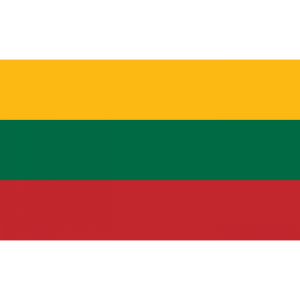Language/Lithuanian/Grammar/Questions
Hi Lithuanian learners! 😊
In this lesson, we will be focusing on questions in Lithuanian. Asking questions is an important part of communication, and by the end of this lesson, you will be able to form and understand different types of questions in Lithuanian. We will also be exploring some cultural aspects related to questioning in Lithuania.
Once you've mastered this lesson, take a look at these related pages: Noun Gender and Declension, Conditional Mood, Present Tense & Conjunctions and Expressions of Time and Place.
Basic question particles[edit | edit source]
In Lithuanian, there are a variety of ways to form a question, but the most common way is to use question particles. These particles are added to the end of a sentence to indicate that the sentence is a question.
The most common question particles in Lithuanian are "ar" and "ne." "Ar" is used to ask a yes/no question while "ne" is used to ask a negative question.
Here is an example of how to use "ar" in a sentence:
| Lithuanian | Pronunciation | English |
|---|---|---|
| Ar jis kalba lietuviškai? | [ar yis KAL-ba LIE-tu-vish-kai] | Does he speak Lithuanian? |
And here is an example of how to use "ne" in a sentence:
| Lithuanian | Pronunciation | English |
|---|---|---|
| Nešokote šokių? | [ne-SHO-ko-te SHO-kiu] | Aren't you dancing? |
Question words[edit | edit source]
In addition to question particles, Lithuanian also has specific question words that are used when asking for more detailed information. Here are some common question words in Lithuanian:
| Lithuanian | Pronunciation | English |
|---|---|---|
| Kas? | [kas] | Who? |
| Ką? | [kaun] | What? |
| Kur? | [kurr] | Where? |
| Kodėl? | [ko-DĖL] | Why? |
| Kaip? | [kai-p] | How? |
Using question words is important when asking open-ended questions and can help to clarify information.
Here is an example of how to use "kas" in a sentence:
| Lithuanian | Pronunciation | English |
|---|---|---|
| Kas jums patinka? | [kas yums pa-TINK-a] | What do you like? |
And here is an example of how to use "kur" in a sentence:
| Lithuanian | Pronunciation | English |
|---|---|---|
| Kur jūs gyvenate? | [kurr yus gi-ve-NA-te] | Where do you live? |
Tag questions[edit | edit source]
A tag question is a special type of question in which the speaker adds a phrase at the end of a sentence to confirm or clarify information. In Lithuanian, tag questions are formed by adding "arba ne" to a statement.
Here is an example of how to use a tag question in Lithuanian:
| Lithuanian | Pronunciation | English |
|---|---|---|
| Jums tai patinka, arba ne? | [yums tai pa-TINK-a ar-ba-ne] | You like it, don't you? |
Tag questions can be useful when trying to get someone's opinion or when trying to confirm information.
Culture corner[edit | edit source]
In Lithuanian culture, it is important to ask proper questions and to show interest in others. When meeting someone for the first time or in a business setting, it is common to ask about their family, job, and interests.
Another important aspect of questioning in Lithuanian culture is knowing when not to ask questions. For example, it is considered impolite to ask about someone's salary or personal finances unless you have a close relationship with that person.
In addition, Lithuanians are known for being quite direct in their questions and conversations, so it is important to be prepared for straightforward, honest answers.
Dialogue[edit | edit source]
- Person 1: Ar tu kalbi lietuviškai? ([Do] you speak Lithuanian?)
- Person 2: Taip, kalbu lietuviškai. ([Yes], I speak Lithuanian.)
- Person 1: Kur jūs gyvenate? (Where do you live?)
- Person 2: Aš gyvenu Vilniuje. (I live in Vilnius.)
- Person 1: Kodėl jums patinka Lietuva? (Why do you like Lithuania?)
- Person 2: Man patinka Lietuva dėl jos kultūros ir gamtos. ([I] like Lithuania for its culture and nature.)
Sources[edit | edit source]
- 3+ Easy Types Of Questions In Lithuanian - Ling App
- Free Lithuanian Language Quiz - Test Your Language
- Take Lithuanian Language Quizzes
➡ If you have any questions, please ask them in the comments section below.
➡ Feel free to edit this wiki page if you think it can be improved. 😎

